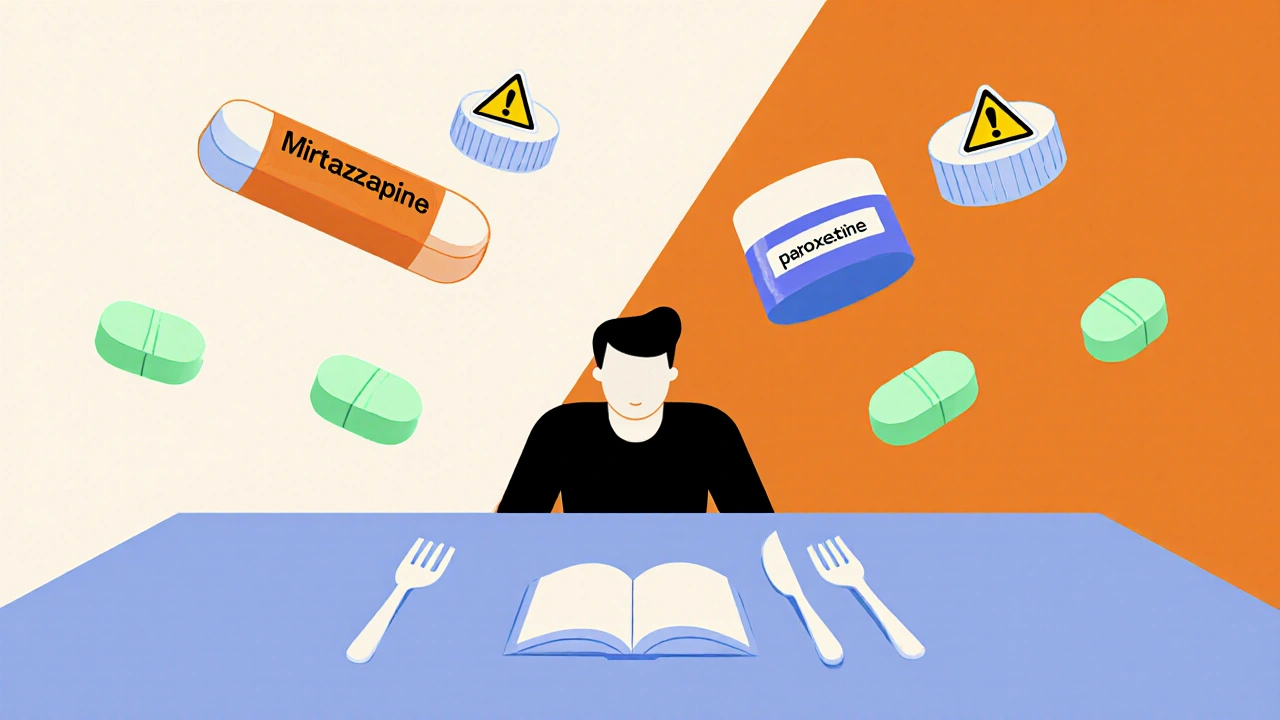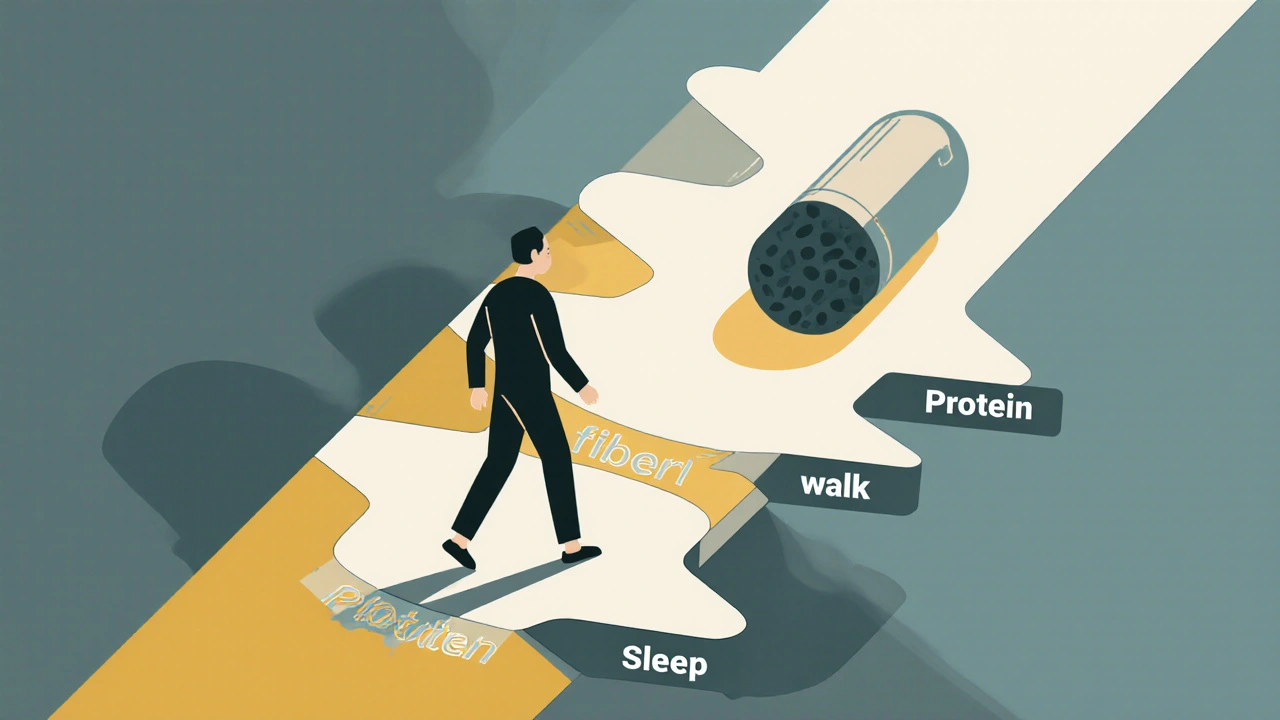Weight Gain from Antidepressants: Which Drugs Cause It and How to Stop It
 Oct, 31 2025
Oct, 31 2025
Antidepressant Weight Gain Comparison Tool
Typical weight gain over 2 years:
It’s not uncommon to hear someone say, "I started taking antidepressants and suddenly I couldn’t stop eating." For many, this isn’t just a joke-it’s a real, frustrating, and sometimes scary change. Weight gain from antidepressants isn’t rare. In fact, 55% to 65% of people on long-term treatment report gaining weight, according to a 2023 review in PMC. And while the average gain might seem small-just a few pounds over two years-it’s often enough to make people quit their medication. That’s dangerous. Stopping antidepressants without medical guidance increases the risk of depression returning by 30% to 50%.
Why Do Antidepressants Make You Gain Weight?
It’s not just about eating more. Antidepressants affect your brain chemistry in ways that go far beyond mood. They change how your body handles hunger, metabolism, and even how it stores fat.
Most antidepressants work by increasing serotonin in the brain. In the short term, that can actually reduce appetite. You feel full faster. But after six to twelve months, your brain starts adapting. Serotonin receptors become less sensitive. That’s when cravings kick in-especially for carbs and sugary foods. Your brain is trying to compensate for the changed chemistry, and food becomes a quick fix.
Some drugs also mess with other systems. Tricyclic antidepressants like amitriptyline and nortriptyline, and the drug mirtazapine, block histamine receptors. That’s why people on these meds often feel hungrier and more tired. Slower metabolism? Check. Increased appetite? Double check.
Then there’s insulin. Some antidepressants make your body less responsive to insulin, meaning sugar stays in your blood longer and gets stored as fat. Leptin and ghrelin-the hormones that tell you when you’re full or hungry-also get thrown off balance. And if you’re genetically a slow metabolizer of certain drugs (CYP2C19 gene), your risk goes up even more.
Which Antidepressants Are Most Likely to Cause Weight Gain?
Not all antidepressants are the same when it comes to weight. Some are practically neutral. Others? Not so much.
High-risk drugs:
- Mirtazapine (Remeron) - Known for causing the most weight gain. Patients often gain 5-10 pounds in the first few months.
- Amitriptyline (Elavil) - A tricyclic antidepressant. Strong effect on histamine and serotonin, high chance of weight gain.
- Nortriptyline (Pamelor) - Similar to amitriptyline, slightly less intense but still risky.
- Paroxetine (Paxil) - An SSRI that stands out for weight gain. Even though most SSRIs are neutral early on, paroxetine is an exception.
- Citalopram (Celexa) - Can cause moderate weight gain over time, especially after a year.
- Phenelzine (Nardil) - An MAOI. Rarely used now, but when it is, weight gain is common.
Lower-risk or neutral options:
- Bupropion (Wellbutrin) - The only antidepressant consistently linked to weight loss or no change. It works on dopamine and norepinephrine, not serotonin, so it doesn’t trigger the same cravings.
- Sertraline (Zoloft) - On average, people gain about 3.2 pounds after two years. Not zero, but manageable.
- Escitalopram (Lexapro) - Around 3.6 pounds at 24 months. Similar to sertraline.
- Duloxetine (Cymbalta) - Only 1.7 pounds at two years. One of the lighter options.
- Fluoxetine (Prozac) - Often causes initial weight loss, but after a year, it levels out. Some gain back what they lost.
Here’s the thing: you’re not alone if you’ve gained weight. But you also don’t have to accept it as inevitable.

What If You’re Already Gaining Weight?
Don’t panic. Don’t quit. Talk to your doctor.
Stopping your antidepressant because of weight gain is one of the biggest mistakes people make. Depression comes back faster than the weight does. And when it does, it’s harder to treat.
Instead, here’s what actually works:
- Switch to a weight-neutral drug - If you’re on mirtazapine or paroxetine and gaining weight, ask about switching to bupropion or sertraline. Many people successfully make the switch without losing their mood gains.
- Add metformin - Originally for type 2 diabetes, metformin helps improve insulin sensitivity. Studies show it can reduce or even reverse antidepressant-related weight gain. It’s safe, cheap, and often covered by insurance.
- Try GLP-1 agonists - Drugs like semaglutide (Wegovy) and liraglutide (Saxenda) are now being used off-label for this exact problem. Clinical trials show patients on antidepressants lost 5-7% of their body weight when adding these drugs. Yes, they’re expensive, but some insurance plans cover them now if you have metabolic issues.
- Focus on protein and fiber - High-protein meals keep you full longer. Fiber slows digestion and stabilizes blood sugar. That means fewer cravings. Swap out white bread for whole grains, chips for nuts, soda for sparkling water with lemon.
- Movement matters more than you think - You don’t need to run marathons. Just 30 minutes of walking five days a week helps reset your metabolism. Strength training twice a week builds muscle, which burns more calories at rest.
And yes-sleep and stress matter too. Poor sleep raises cortisol, which increases belly fat. Chronic stress makes your body hold onto weight. If your antidepressant isn’t helping your anxiety, you’re stuck in a loop.
Is It Really the Medication-or Just Feeling Better?
This is a big one. Many people lose weight when they’re depressed. They don’t eat. They lose interest in food. When the antidepressant starts working, their appetite comes back. Suddenly, they’re eating like they used to. That’s not the drug making them gain weight-that’s their body returning to normal.
That’s why doctors look at patterns. Did you gain weight before you started the drug? Did you lose weight during your worst depression? Are you eating more because you’re hungry-or because you’re bored, stressed, or emotionally eating?
It’s rarely just one thing. It’s the drug, yes-but also your recovery, your habits, your stress levels, your sleep, your genetics. That’s why a one-size-fits-all approach doesn’t work.

What About Bupropion? Is It the Answer?
Bupropion is the outlier. It’s the only antidepressant that doesn’t increase serotonin. Instead, it boosts dopamine and norepinephrine. That means no serotonin receptor downregulation. No carb cravings. No insulin spikes.
Studies show people on bupropion lose 0.25 pounds at six months. At two years? They gain 1.2 pounds-far less than the 3-4 pounds others gain. For someone who’s overweight or has prediabetes, that difference matters.
But bupropion isn’t perfect. It can cause insomnia or anxiety in some people. It’s not ideal if you have a seizure disorder. And it doesn’t work as well for everyone with depression, especially those with severe anxiety.
Still, if weight is a major concern-and you’re not at high risk for seizures or agitation-it’s often the best first choice.
What You Should Do Next
Here’s a simple action plan:
- Track your weight and eating habits - For two weeks, write down what you eat and how you feel. Don’t judge. Just observe.
- Check your medication - Is it one of the high-risk ones? If yes, don’t panic, but start a conversation with your doctor.
- Ask about alternatives - Can you switch to bupropion? Sertraline? Duloxetine? What are the pros and cons?
- Request a metabolic check - Ask for fasting glucose and insulin levels. If they’re high, metformin might be an option.
- Start small with movement - Walk after dinner. Take the stairs. Park farther away. These tiny changes add up.
Weight gain from antidepressants isn’t a personal failure. It’s a biological side effect. And like any side effect, it can be managed-with the right information, the right support, and the right plan.
Do all antidepressants cause weight gain?
No. While many do, especially over time, some are much less likely to cause weight gain. Bupropion is the most consistent exception-often linked to no change or even slight weight loss. Sertraline, duloxetine, and fluoxetine tend to have minimal impact compared to drugs like mirtazapine or paroxetine.
How long does it take to gain weight on antidepressants?
Weight gain usually starts after six months and becomes more noticeable after one to two years. The first few months might even bring weight loss due to improved appetite after depression. But as your brain adjusts to higher serotonin levels, cravings for carbs and sugars increase, leading to gradual weight gain.
Can I lose the weight I gained from antidepressants?
Yes. Many people successfully lose the weight by switching medications, adding metformin, improving their diet, and increasing physical activity. GLP-1 agonists like semaglutide have shown strong results in clinical trials, helping patients lose 5-7% of body weight while still taking their antidepressant.
Should I stop my antidepressant if I’m gaining weight?
No. Stopping abruptly can cause withdrawal symptoms and increase your risk of depression returning by up to 50%. Instead, talk to your doctor about switching to a different medication or adding a weight-management strategy. Your mental health is more important than the scale.
Is weight gain from antidepressants permanent?
Not necessarily. Some weight gain reverses when you switch medications or adopt healthier habits. However, research suggests that long-term use of certain antidepressants, especially when combined with stress and poor diet, can lead to lasting metabolic changes-even after stopping the drug. That’s why early intervention matters.
Can diet and exercise prevent weight gain from antidepressants?
They can help a lot. A diet high in protein, fiber, and healthy fats reduces cravings. Regular movement improves insulin sensitivity and boosts mood naturally. While they won’t block the biological effects of the drug, they can significantly reduce the amount of weight you gain-and even reverse it over time.

Torrlow Lebleu
November 1, 2025 AT 13:22Let me break this down for you like you’re five. Mirtazapine is basically the junk food of antidepressants - it turns your brain into a vending machine that only accepts carbs. And yeah, paroxetine? Same deal. But here’s the kicker - most people don’t realize it’s not the drug itself, it’s the serotonin receptor downregulation after 6 months. Your brain’s like, ‘oh cool, more serotonin’… then it’s like ‘nah, we good’ and starts craving sugar to compensate. You think you’re eating for joy? Nah. You’re eating for neurochemistry. And if you’re CYP2C19 slow metabolizer? Congrats, you’re basically a weight gain lottery ticket.
Christine Mae Raquid
November 2, 2025 AT 15:37i swear to god i gained 20lbs on paxil and then just quit cold turkey and now im ‘cured’ lmao. who needs therapy when you got willpower?? also why do doctors always act like we’re dumb? i know i’m not ‘just emotionally eating’ i’m just tired of being told what to do. also my mom says antidepressants are for weak people so i stopped. no regrets. 😘
Sue Ausderau
November 4, 2025 AT 04:34I just want to say - if you’re reading this and you’re struggling with weight gain while on meds, you’re not broken. Your body isn’t failing you. It’s adapting. And that’s not weakness. It’s biology. I was on sertraline for three years. Gained 12 pounds. Didn’t feel like myself. But I didn’t quit. I talked to my doctor. We switched to bupropion. And slowly, I started feeling like me again - not just in mood, but in body. It took time. But healing isn’t linear. You’re allowed to need help. And you’re allowed to want to feel at home in your own skin.
Tina Standar Ylläsjärvi
November 4, 2025 AT 06:57Hey, if you’re on mirtazapine and gaining weight - don’t stress, just swap. Bupropion is the real MVP here. I was on it for anxiety and lost 8 lbs in 3 months without even trying. Also, metformin is a game changer. My doc prescribed it and I was skeptical, but my fasting glucose dropped and my cravings vanished. No magic pill, but it helps. And yeah, protein + fiber is basic, but it works. Try hard-boiled eggs and broccoli for snack. Your future self will thank you. You got this 💪
M. Kyle Moseby
November 4, 2025 AT 14:44People are too lazy to move. Just walk. Eat less junk. Stop blaming the pill. My cousin took Zoloft and stayed skinny. You just need discipline. No excuses. If you can’t control your eating, you can’t control your life. Depression is weak. You gotta be strong.
Zach Harrison
November 5, 2025 AT 18:34Honestly? This post was way more helpful than my last 3 psych appointments. I’m on citalopram and have gained like 15 lbs over 18 months. Didn’t realize it was the serotonin receptor thing. Also didn’t know metformin could help. My doc never mentioned it. I’m gonna ask about switching to bupropion next visit. Also - walking after dinner? That’s stupid simple but I’ll try it. Thanks for not being a jerk about it.
Terri-Anne Whitehouse
November 6, 2025 AT 01:20How quaint. A 55% weight gain statistic cited from PMC - how… pedestrian. The real issue here is the commodification of mental health. We’ve turned depression into a metabolic spreadsheet. GLP-1 agonists? For a *mood disorder*? This isn’t medicine, it’s pharmaceutical capitalism with a side of keto. And yet - you’ll all be lining up for Ozempic while your serotonin receptors weep in silence. How very modern.
Matthew Williams
November 7, 2025 AT 12:01Oh so now we’re blaming the meds? I’ve been on antidepressants since 2015 and I’m still ripped. You’re just fat because you eat like a pig and sit on your ass all day. Stop crying and get off the couch. This country is full of weaklings who think a pill should fix everything. If you can’t control your appetite, you don’t deserve to be healthy. Also - bupropion? That’s for losers who can’t handle real life. Just quit the meds and go lift. Simple. No excuses.
Dave Collins
November 9, 2025 AT 08:01Oh wow. A 15-sentence essay on why my antidepressant made me gain weight. Did you also include a flowchart? A PowerPoint? A Spotify playlist called ‘Serotonin & Sourdough’? I’m just here for the drama. But seriously - if you’re on mirtazapine and gaining weight, congratulations. You’ve unlocked the ‘Depressed & Doughy’ achievement. Next level: asking your doctor if you can swap it for something that doesn’t make you crave donuts like they’re oxygen. Or… you know. Just eat the donut. Live your truth. I’m not judging. (Okay maybe a little.)
Idolla Leboeuf
November 10, 2025 AT 16:21Switched from paroxetine to bupropion. Lost 14 lbs in 4 months. Started walking 30 mins a day. Started eating real food. Not because I was told to - because I wanted to feel alive again. You’re not broken. You’re just waiting for the right step. One step. That’s all it takes. You’re not alone. I’ve been there. You got this. Now go drink some water and take a walk. Right now. I’ll wait.